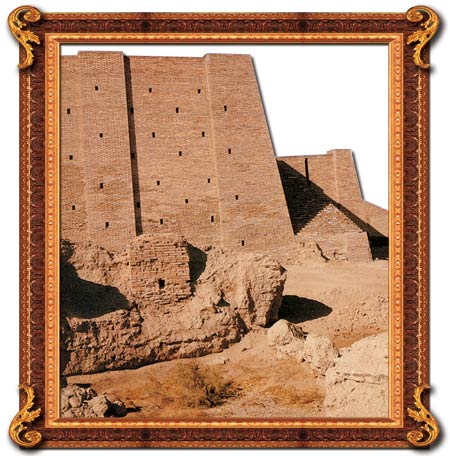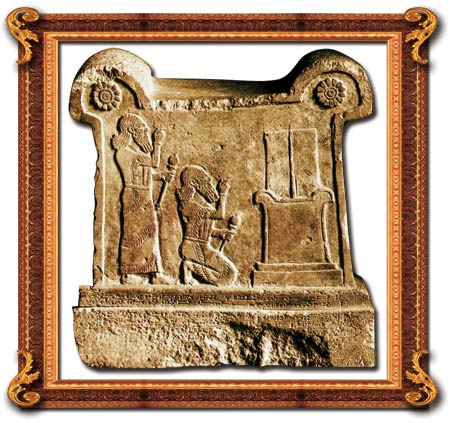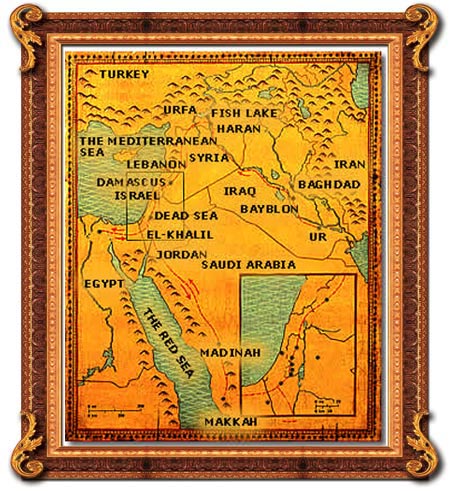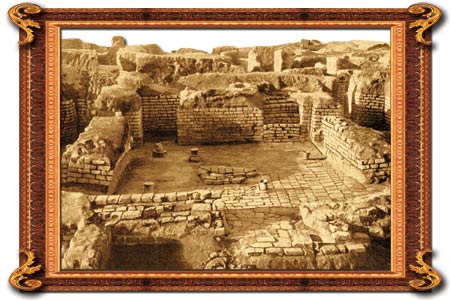You have an excellent example in Abraham and those with him. (Surat al-Mumtahana: 4)
Allah reveals that the first prophet was the Prophet Adam (pbuh). The Prophet Abraham (pbuh) lived after the Prophet Noah (pbuh) and according to the Qur'an, he is a descendant of the Prophet Noah (pbuh) ( Surat as-Saffat: 83). Many of the Prophet Abraham's (pbuh) descendants were prophets as well, such as the Prophets Isaac, Ishmael, Jacob, Joseph, Moses, Aaron, David, Solomon, Zacharia, John, Jesus and Muhammad (peace be upon them all).
 You have an excellent example in Abraham and those with him. (Surat al-Mumtahana: 4) |
Historical sources record that the Prophet Abraham (pbuh) lived in Mesopotamia. The Qur'an informs us that he and his son, the Prophet Ishmael (pbuh) built the Ka`bah. This confirms the historical accounts that the Prophet Abraham (pbuh) did indeed live in the Middle East.

The ziggurat of Ur, built by Ur Nammu (2112-95 BCE) to worship the Moon. According to Hammurabi's inscriptions, Ur was Sumeria's most famous city.
Allah states in the Qur'an that the Prophet Abraham's (pbuh) tribe followed paganism. In fact, historical sources state that nearly all Middle Eastern tribes at that time either worshipped hand-made idols or various celestial bodies (e.g., the Moon and the Sun). Excavations in Mesopotamia have uncovered information and remains of temples (ziggurats) built for such worship, as well as the remains of many stone and clay statues.
In short, both the historical and archaeological facts show that the majority of the Middle East, at the time of the Prophet Abraham (pbuh), was a pagan land. Allah chose the Prophet Abraham (pbuh), by honoring him with prophethood, as His pure servant to represent the Divine religion and proper moral virtues in the midst of these misguided pagans.
Our Lord reveals that the Prophet Abraham's (pbuh) tribe carved statues made of stone or wood and then as a great deviance they regarded them as false deities and worshipped them. Although devoid of power and life, these pagans believed that these idols could either harm or help them. Due to these superstitious beliefs, they blindly followed the misguided belief system of their ancestors and passed it on to the next one.
Allah revealed to the Prophet Abraham (pbuh) that He was the Creator of everything in the universe and that those who believed otherwise were utterly mistaken. Although his tribe wanted him to live and think like them, the Prophet Abraham (pbuh) turned his back on his tribe's traditional belief system, rejected its false deities, and declared that only Allah truly existed. In order to deepen and reinforce his faith, Allah showed the Prophet Abraham (pbuh) proofs of His power and dominion:
Because of that, We showed Abraham the dominions of the heavens and Earth so that he might be one of the people of certainty. (Surat al-An'am: 75)

Remains found in Mesopotamia depict the local societies' idolatrous and
superstitious belief system. In this picture, King Tukulti-Ninurta of Assyria
bows before the light and fire-god Nusku, who is symbolized by a throne.
Although he grew up among pagans, the Prophet Abraham (pbuh) exhibited such a very superior character and such an excellent moral understanding that he finally separated himself from them and devoted himself to Allah. But he did not content himself with this separation alone, for he then sought to explain Allah's existence to them and called them to belief in Him. Most people of his tribe, however, refused to accept the truths he told them out of loyalty to their ancestors' superstitious religion. As Allah states in the Qur'an:
When they are told: "Follow what Allah has sent down to you," they reply: "We are following what we found our fathers doing." What, even though their fathers did not understand a thing and were not guided! (Surat al-Baqara: 170)
One of the reasons why his tribe refused to abandon their traditional paganism is found among all people who are distant from true religion: According to them, the ideas of the majority are considered to be right, even though they are deviant and superstitious. According to this distorted logic of these people, questioning, researching, or criticizing widely held ideas are unacceptable. This mistake is so important that Allah states it in the Qur'an and tells all people to avoid it, as follows:
If you obeyed most of those on Earth, they would misguide you from Allah's way. They follow nothing but conjecture. They are only guessing. (Surat al-An'am: 116)
The Prophet Abraham (pbuh), like all prophets and believers, did not make this mistake. He never abandoned the truth, even when his relatives and friends—in fact, his whole tribe—opposed him. His belief in Allah was unshakable, and no difficulty or pressure could turn him from his chosen path.
 Our prophet( may Allah biess him and grand him peace)said:"Every prophed has friends from among the probhets.My friend is Abraham,my forebear and the friend(khalil)of my Lord."He then recited the following verse: "The people with the strongest claim to Abraham are those who followed him and this probhet,and those who believe. Allah is the Protector of the believers." (Surah Al'Imran:68) (Hadith at-Tirmidhi) |
All societies have been aware of Allah's existence, Oneness, Infinite Might and Power; of the Day of Judgment; and of what Allah wills from His servants. Allah reveals this truth in the following verse:
We sent a messenger among every tribe saying: "Worship Allah and keep clear of all false deities." Among them were some whom Allah guided, but others received the misguidance they deserved. Travel about the land and see the final fate of the unbelievers. (Surat an-Nahl: 36)
Prophets are special people whom Allah selected and endowed with superior qualities. Their powerful faith, pleasing moral virtues, superior character, and exemplary behavior always attracted those around them, and eventually they were forced to move away from their pagan and misguided societies. One of the most important qualities setting them apart is the fact that Allah revealed the truth to them. As Allah reveals in the Qur'an:
We have revealed to you, as We revealed to Noah and the prophets who came after him. And We revealed to Abraham, Ishmael, Isaac, Jacob, the Descendents, Jesus, Job, Jonah, Aaron, and Solomon. And We gave David the Psalm. (Surat an-Nisa: 163)
Allah's use of prophets to spread His revelation among their people was a great blessing for humanity, for His revelation continues to show people the way to the true path, teach them how to worship, describe proper moral values, and makes His religion known to those people who live after the time of the Prophet Muhammad (may Allah bless him and grant him peace), the last prophet. Our Lord informs us that He has revealed to the prophets how their followers should behave and worship Him:
We made them leaders, guiding by Our command, and revealed to them how to do good actions, perform prayer, and give alms. And they worshipped Us. (Surat al-Anbiya: 73)
Throughout their lives, the prophets sought to gain His good pleasure and compassion, as well as His Paradise. Thus, they lived exemplary lives by fully complying with His commands.
Allah bestowed prophethood, an honorable position attained by His chosen servants, upon the Prophet Abraham (pbuh) after a period of testing. Allah reveals this in the following verse:
Remember when Abraham was tested by his Lord with certain words, which he carried out perfectly. He [Allah] said: "I will make you a model for humanity." He [Abraham] asked: "And what of my descendents?" He [Allah] replied: "My contract does not include the wrongdoers." (Surat al-Baqara: 124)
As stated in this verse, the Prophet Abraham (pbuh) obeyed our Lord during this test and perfectly fulfilled all of His commands. Just like the Prophet Abraham (pbuh), all believers have the same responsibility. His unconditional obedience to Allah and submission to His commands are fine models for all believers.
 |  The broken red line shows the Prophet Abraham's (pbuh) route in the light of historical records. He left Ur, in Sumeria, and eventually reached Mecca. (Overleaf) Excavations outside the city walls of Ur reveal the remains of a settlement dating from 2000 BCE. Historians state that the Prophet Abraham's (pbuh) people may have lived in similar houses. |
Allah endowed the Prophet Abraham (pbuh) with prophethood at an early age (Surat al-Anbiya: 60), and revealed the truth to him:
Or do they in fact envy other people for the bounty Allah has granted them? We gave the family of Abraham the Book and Wisdom, and We gave them an immense kingdom. (Surat an-Nisa: 54)
In other verses, Allah reveals that He gave texts to the Prophet Abraham (pbuh) and his descendents:
… although the Hereafter is better and longer lasting. This is certainly [stated] in the earlier texts, the texts of Abraham and Moses. (Surat al-A'la: 17-19)
Or has he not been informed what is in the texts of Moses and of Abraham, who fully discharged [his mission]? (Surat an-Najm: 36-37)
This shows that Allah had sent down texts to the Prophet Abraham (pbuh) before His revelation of the Torah to Prophet Moses (pbuh). These texts contain the true religion, which is based on the Prophet Abraham's (pbuh) submission to Allah. The hadith literature records the following conversation:
I [Abu Dharr] asked: "O Messenger of Allah, has anything from the pages of the Prophet Abraham (pbuh) and the Prophet Moses (pbuh) been sent down to you?"
He replied: "O Abu Dharr," ["Yes," he said, "such verses were revealed," and began to read them:] "Everyone who cleans himself well, recalls the name of the Lord, and performs the prayers has achieved his hopes. Perhaps you hold the life of this world to be superior. But the Hereafter is more auspicious and more constant. These [truths] also exist in previous pages, the pages of Abraham (pbuh) and Moses (pbuh)."1
1.Al-Hafiz ibn al-Dayba ` al-Shaybani, Taysir al-'usul ila Jami` al-'usul, 860.